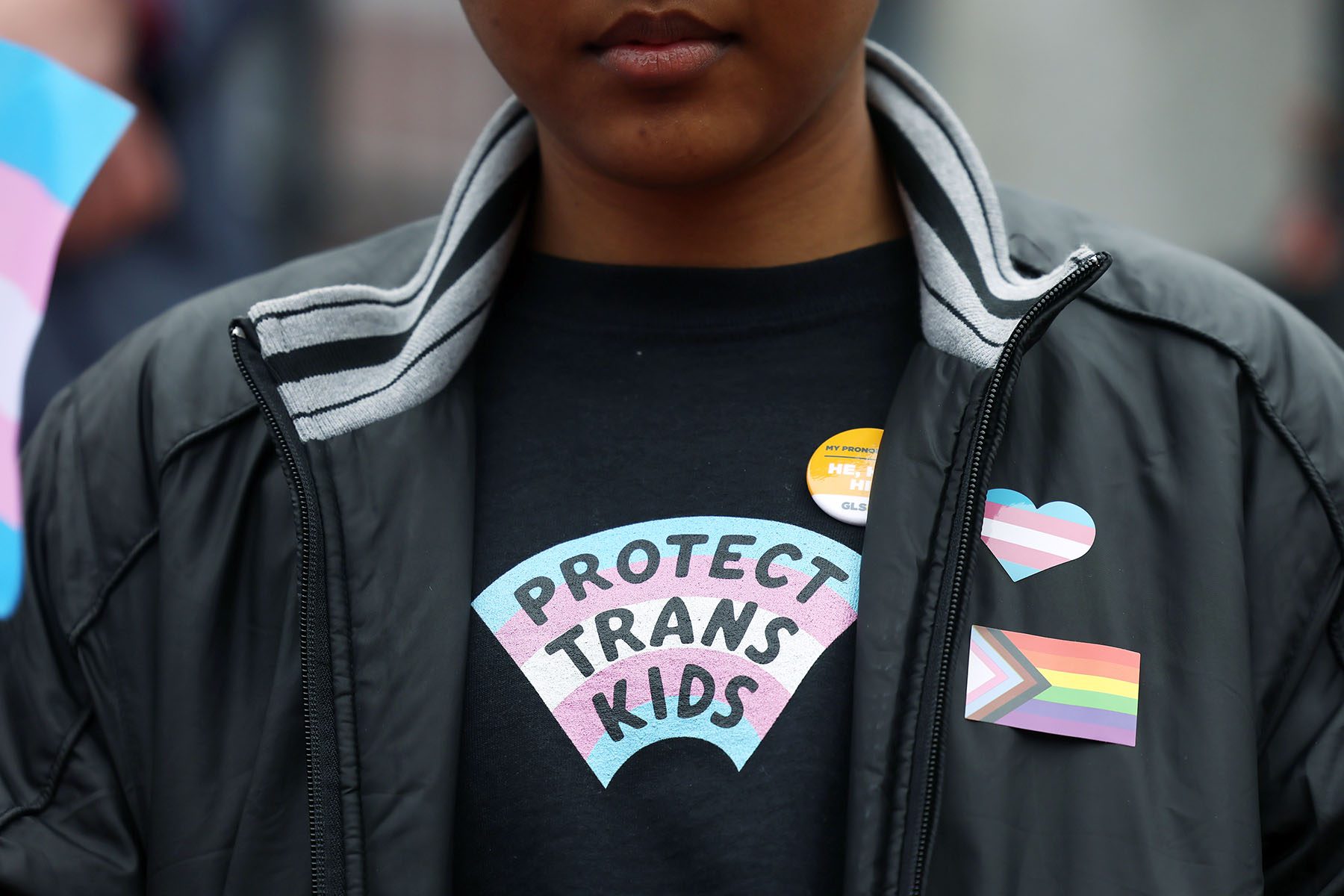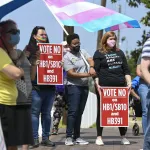We’re answering the “how” and “why” of LGBTQ+ news. Subscribe to our daily newsletter.
LGBTQ+ youth say that state proposals restricting their rights in schools, sports and doctor’s offices are negatively affecting their mental health, leaving them angry, sad and stressed, according to a new online poll released Thursday by Morning Consult and the Trevor Project, an LGBTQ+ youth crisis organization.
Researchers and advocates worry that if these policies go into effect, they would also limit resources and support systems for queer and trans youth to cope with worsening mental health.
“When I was growing up, we had a lot of anti-LGBTQ+ rhetoric, but it wasn’t so in your face,” said Austin Johnson, who teaches sociology at Kenyon College and studies LGBTQ+ health. “Lawmakers weren’t trying to pass bills so that I couldn’t talk to my teacher, talk to my counselor, talk to my parent. They weren’t criminalizing the authority figures and support systems in my life.”
Seventy-one percent of the 716 surveyed LGBTQ+ youth, ranging from teenagers to young adults who took the online poll last fall, said that debates around state laws restricting the rights of LGBTQ+ young people had negatively impacted their mental health. Twenty-seven percent characterized the negative effect as severe.
Outside experts who research the experiences of LGBTQ+ youth say this data aligns with growing evidence that anti-LGBTQ+ bills exacerbate the mental and emotional struggles of queer youth — especially those who live in states that propose legislation that harms them or who live in places without robust protections.
Ryan Watson, an associate professor at the University of Connecticut who has researched the experiences and health disparities facing LGBTQ+ teenagers, is not surprised that LGBTQ+ youth say these proposed laws are worsening their mental health. Prior research has found that LGBTQ+ adults in states with fewer legal protections reported worsened mental health — and within schools, policies that give protections to LGBTQ+ students can benefit their overall wellbeing. LGBTQ+ students who live in states with equity laws are also less likely to experience bullying.
-
More LGBTQ+ coverage
- Canceled high school play raises concerns over ripple effects of Florida’s ‘Don’t Say Gay’ law
- ‘They’re erased’: When trans people are misgendered after death, the consequences extend beyond paper
- Republicans doubled down on anti-LGBTQ+ rhetoric in the midterms. It wasn’t a winning platform.
To Watson, the new survey of 13- to 24-year-olds also encapsulates the present reality of LGBTQ+ rights: kids are at the forefront of the political fight, instead of adults.
In several states, support systems in schools — which had already been lacking for LGBTQ+ youth — are under political duress. States are proposing more bills that would direct school employees to address students using pronouns that match their sex assigned at birth, effectively ordering the misgendering of trans or nonbinary children unless a parent provides written permission. There are also bills to restrict what teachers can say in the classroom about LGBTQ+ people, and to mandate that school employees out trans students to their parents.
“Legislators, politicians should be really mindful that the laws they pass have immediate, real-world impact on kids’ lives,” Watson said. “All these bills aren’t passing, and in some states we know they may not pass, but just the fact that politicians will even consider bringing it up is severely impacting the happiness, the connections that kids have.”
Transgender and nonbinary youth who responded to the online survey reported greater feelings of fear and alienation in the face of legislation that is, for the most part, targeted at curtailing their rights, as opposed to the rights of LGBTQ+ youth overall.
A large majority — 86 percent — of surveyed trans and nonbinary youth said that debates around state laws restricting LGBTQ+ rights for young people had negatively impacted their mental health. When asked about other effects of these policies, trans and nonbinary youth were more likely than cisgender queer youth to say they experienced more bullying in the past year due to these policies, though outside experts cautioned that direct causality could not be proven. Trans and nonbinary youth were also more likely than cisgender queer youth to say that anti-LGBTQ+ policies made them feel less safe going to the doctor or hospital when they were sick.
The common theme of proposed anti-trans bills is that they shrink the number of safe and affirming spaces, and the number of safe and affirming people available to support trans and nonbinary youth, said Casey Pick, senior fellow for advocacy and government affairs at the Trevor Project. In addition to some trans youth being more hesitant to seek health care after calls to ban gender-affirming care, so-called “Don’t Say Gay” bills that restrict teachers from discussing LGBTQ+ issues prevent teachers from taking affirmative steps to protect the mental health of queer students, she said.
Diego Sanchez, director of advocacy, policy and partnerships at PFLAG National, which advocates for LGBTQ+ families and allied parents, said that adults who want to help LGBTQ+ youth in their life should express that their feelings in response to anti-LGBTQ+ bills — including anger — are valid.
“Make sure that the kids know … that the feelings that they’re having are affirmed, that they’re real feelings,” Sanchez said. Validating those feelings, especially when they’re part of a different experience than their siblings or friends, is important, he said — and so is conveying to LGBTQ+ youth that they deserve to thrive and live full lives, despite what legislation may be making them feel.
For parents of LGBTQ+ youth looking for local connections or resources, Sanchez recommended reaching out to local PFLAG chapters and checking out LGBTQ+ books for young adults recommended by the Rainbow Round Table of the American Library Association. The Trevor Project also offers mental health resources, and the Gay, Lesbian and Straight Education Network (GLSEN) website contains state-level policy maps.







